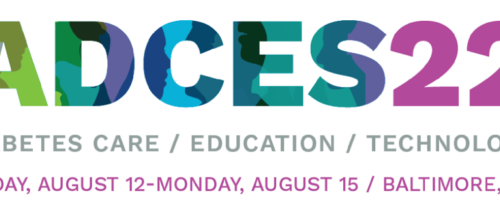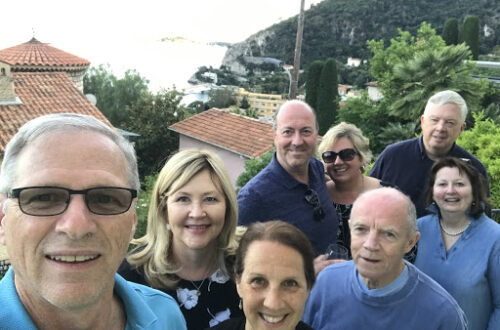
Tami and Deb enjoying fresh views in Chicago, finding freedom and joy in life.
T
Of course different people fulfill different functions in this world. It cannot be otherwise. As far as intellectual or physical abilities are concerned – knowledge, skills, talents, and energy levels – human beings differ widely. What really matters is not what function you fulfill in this world, but whether you identify with your function to such an extent that it takes you over and becomes a role that you play. When you play roles, you are unconscious.“ – Eckhart Tolle
Deb’s been listening to an Oprah’s Book Club book on Audible, Eckhart Tolle A New Earth: Awakening to Your Life’s Purpose. While Deb has found the book deep, and a challenging “read”, she’s found that it creates an opportunity to take an introspective look at the way we engage in the world. Tolle believes everyone can find “the freedom and joy of life” if they live in the present moment.
Deb has also been listening to Oprah’s weekly Super Soul Conversations Podcast to review each chapter of the book, typically while taking her daily walk (and it’s helping a lot to understand and internalize the concepts). During a recent podcast there was discussion between Oprah and Tolle about roles people play and how roles inhibit thinking. In applying some of Tolle’s principles to our mission and vision here @AFreshPOVforYOU, there was an “a ha” moment for Deb around how the #languagematters movement in healthcare needs to expand to include not just the words we use, but also how we implement person first language. (check out our November blog on why language matters here) To really put the person (not the “patient”) first, there needs to be a “person” on both sides of the interaction for true person centered care.
One section of Oprah’s weekly podcast addressed healthcare and how when a healthcare professional “plays the role of healthcare professional”, he or she may become “unconscious” of the fact he or she is a human person while embracing their “healthcare role”. And, that the “patient” across from them is also a person. Something vital is then missing. And as a result, the person (“patient) may end up feeling disconnected and dismissed.
The discussion brought to mind a recent #DSMA Twitter chat that @AFreshPOVforYou joined a couple of weeks ago. One question asked during the chat was: “How can healthcare practitioners facilitate more empowering or effective communication with patients or vise versa?” One enlightened participant, the incredible behavioral and data scientist Dr. Chandra Osborn replied, “Be a human first – a practitioner second.”
Her reply really struck a chord, and aligns with the closing words in Tolle’s quote above, “When you play roles, you are unconscious.“ Let’s repeat that…..”When you play roles, you are unconscious”. How can there be empowering or effective communication if people are not “present” and if they are “unconscious”?
Along those lines, We @AFreshPOVforYOU have experienced this first hand.
Deb’s experience…
Deb recalls a visit with her daughter to the pediatrician where they never once made eye contact. The doctor typed on the computer the whole time, asking impersonal questions and fulfilling her role. They did not feel like they were part of the conversation.
Tami’s experience…
Tami remembers a similar scenario while sitting alongside her mom at hospital discharge following her mom’s knee surgery. The healthcare team was talking all “around” both of them, talking to each other, asking questions, giving a multitude of instructions, rarely looking at them or expressing interest in their point of view or concerns. They did not feel like they were part of the conversation either.
We’ve heard many similar stories from people with diabetes – how at times the relationship with their healthcare provider was not ideal. Some have stated they cancelled an appointment because they didn’t want to be scolded for an A1C value that was higher than expected. Or because their weight was up a few pounds.
In traditional healthcare people with diabetes are expected to play the role of patient and clinicians play the role of doctor, nurse, dietitian etc. Yet this type of engagement does not promote healthy communications and relationships. As Tolle recounts, “Authentic human interactions become impossible when you lose yourself in a role.”
We’ve experienced being on both sides of this equation. As diabetes educators, we are always striving to improve, but we are not perfect. We’ve made our share of mistakes, but we’ve grown and learned from them. Deb recalls one client she saw years ago that was very frustrated with her because she was following the “assigned content” for the appointment per the prescribed healthcare provider orders, and at the end of the visit the client said, “we didn’t have time for any of my questions!” That meeting really left an impact on her, she was playing the “role” of a diabetes educator and she never made that mistake again. Fast forward to a more recent experience when she received a call from a healthcare provider who referred his patient to her. The doctor said, “I’m not quite sure what you did, but Mr. Jones is never satisfied with anything or anyone, but he could not stop talking about how his appointment with you was the best diabetes visit he’s ever had.” You know what she did? She started by asking him about his family and recent vacation, and then asked what was going well with his diabetes management? She was being a human first and he was treated like a person.
If you follow our blog, you know that we are advocates of solution focused therapy. In the context of solution focused therapy, the client/person with diabetes is viewed as the expert and the most important element is the “therapeutic alliance” between the client and the practitioner. The relationship is the key to being able to work together. And to build a relationship it requires being present, being conscious of one’s own behaviors, use of language, and body language which all tell a story. We believe it’s critical to enter healthcare exchanges as a human first- not playing a role – with each party recognizing their part in the conversation/interaction as valuable.
Our goal, through incorporating principles of solutions focused therapy and coaching in diabetes care and education, is to change the conversation, the interaction and the experience of the diabetes community to improve health. As Eckhart Tolle says, we need to “become conscious of being conscious.” We need to work as a team, be present in all of our interactions and most of all be human.
In closing, we leave you with a few thoughts on what you can do when you engage in a healthcare interaction.
If you are a healthcare provider:
- Be human first
- Check your ego at the door
- Appreciate that the person in front of you is as an expert on their condition
- Listen carefully before speaking
- When possible, sit on the same side of the table
- Understand the burden associated with living with a chronic condition
If you are a person living with a chronic condition:
- Be human first
- Actively participate in your medical appointments and your self-management to the best of your ability
- Work in partnership with your care team
- Be honest about your capabilities
Subscribe to our blog and we’ll email you when a new post is published!
Follow us on Twitter and Instagram @AFreshPOVforYou.




